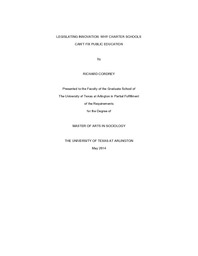
ATTENTION: The works hosted here are being migrated to a new repository that will consolidate resources, improve discoverability, and better show UTA's research impact on the global community. We will update authors as the migration progresses. Please see MavMatrix for more information.
Show simple item record
| dc.contributor.author | Cordrey, Richard | en_US |
| dc.date.accessioned | 2014-07-14T20:34:35Z | |
| dc.date.available | 2014-07-14T20:34:35Z | |
| dc.date.issued | 2014-07-14 | |
| dc.date.submitted | January 2014 | en_US |
| dc.identifier.other | DISS-12592 | en_US |
| dc.identifier.uri | http://hdl.handle.net/10106/24507 | |
| dc.description.abstract | How do we account for the fact that, despite myriad school reform and counterbalancing resistance efforts, the education system in America seems to be in a constant state of disrepair? Some observers attribute this to the introduction of accountability measures and voucher programs, while others claim that common curriculum standards, and accompanying standardized tests, are to blame. In the face of constant opposition to non-traditional educational venues by various special interest groups, there are a growing number of educational leaders opening schools that aim to challenge institutional norms and ever-growing numbers of parents choosing to enroll their children in those schools. Realization of the promise of these new schools is in serious jeopardy due to institutional and social forces that dampen any effort to challenge existing arrangements. Using charter schools as the most relevant and powerful entity representing this trend, I examine the history and motivation behind the structure of contemporary American education and propose a new way of evaluating the efficacy of future school reform. | en_US |
| dc.description.sponsorship | Agger, Ben | en_US |
| dc.language.iso | en | en_US |
| dc.publisher | Sociology | en_US |
| dc.title | Legislating Innovation: Why Charter Schools Can't Fix Public Education | en_US |
| dc.type | M.A. | en_US |
| dc.contributor.committeeChair | Agger, Ben | en_US |
| dc.degree.department | Sociology | en_US |
| dc.degree.discipline | Sociology | en_US |
| dc.degree.grantor | University of Texas at Arlington | en_US |
| dc.degree.level | masters | en_US |
| dc.degree.name | M.A. | en_US |
Files in this item
- Name:
- Cordrey_uta_2502M_12592.pdf
- Size:
- 708.3Kb
- Format:
- PDF
This item appears in the following Collection(s)
Show simple item record


